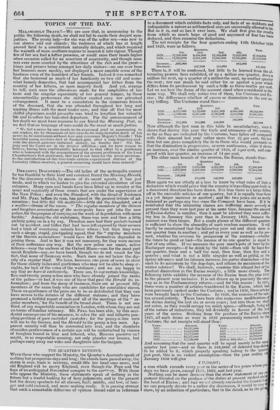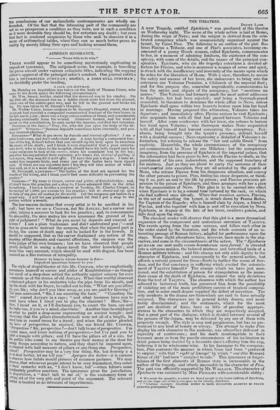THE QUARTER'S REVENUE.
WITH those who support the Ministry, the Quarter's Accounts speak of nothing but prosperous days and long: the clouds have passed away, the storm is over, trade is reviving, credit lifts her head once more, and old England will be merry England, even though the Pope and the fogs of an anticipated November conspire to the contruy. With those who oppose the Ministry, these statements speak of nothing in the future but a fearful looking for of fiery judgments, and in the present but the dreary spectacle for all classes, high, middle, and low, of hun- ger and cold endured, and more making ready. It is passing strange that such a remarkable difference of opinion should exist in reference indisputable a nature as arithmetical ones are universally allowed to be. But so it is, and so has it ever been. We shall first give the results deduced, and then examine the deductions. The net receipts for the four quarters ending 10th October l828 and 1829, were as follows.
Quarters. Year. 1st. 2nd. 3rd. 4th.
1829 /829 Increase Decrease 12,336,000 13,022,000 —.
,686,000 9,898,000 9,351,000 12,364,000 12,051,000 13,020,000 13,084,000 47,619,000 47,472,000 147,000 547,000 313,090 064,000 There is, it will be confessed, but little to be learned from the al- ternating process here exhibited, of up a million one quarter, down a million the next, up a quarter of a million the next, up another quarter the next ; nor can much be said either for or against a year which differs from its predecessor by such a trifle as three-tenths per cent. Let us see how the items of the account stand when considered in the same way. We shall only notice two of then, the Customs and Ex- cise ; the differences whether of excess or diminution in the rest are very trifling. The Customs stand thus :— — to a document which exhibits facts only, and facts of so stubborn and from which so much hope of good and argument of fear has been
Now although the last sum in this table be unsatisfactory, since it shows that during this year the trade and conmerce of the country, so far as they are indicated by the Customs, have fallen off compared with their amount last year rather more that. 21 per cent, the last item but one gives completely the lie to those wit) would persuade us that the diminution is progressive, or even continuous, since it shows an increase, over the similar quarter of 1828, of 8 per cent, and com- pared with last quarter, an increase of 14 per cent.
The other main branch of the revenue, the Excise, stands thus : 1st. Quarters.
2nd. 3rd. 4th. Year.
1828......4,229,000 3,699,000 4,264,000 5,714,000 17,906,000 1629 .....0,025,000 3,497,000 4,115,00 5,268,000 17,904,000 Increase.. 796,000
Decrease . 207,000 149,000 446,000 2,000 1st. Quarters.
2nd. 3rd. 4th. Year.
1828 ..... 4,022,000 3,720,000 3,951,000 4,665,000 16,358,000 1829 3,790,000 3,437,000 0,705,000 5,028,000 15,901,00(1 Increase
363,000
Decrease . 232,000 283,000 246,000
397,000 And assuming that the next quarter will be equal merely to the same 11 to be added to it, which properly speaking belong to the citrate a a sum which exceeds every year in the series of ten years whose pre
off in the excisable articles of one quarter, but it is equally true there is a yet larger increase in another ; and the two years are as nearly 'balanced'as perhaps any two since The Conquest have been. If it be concluded that the labouring classes are suffering more severely at present than they were last year at the same time, because the amoimt of Excise-duties is smaller, then it must be allowed they were suffer- ing less in January this year than in January 1828, because the amount was then larger. But a single glance at the different quarters is sufficient to show the absurdity of such random assertions. It will hardly be maintained that the labouring poor eat and drink more in one quarter than in another ; and yet in every year as well as the pre-, sent, whether the revenue be prosperous or the contrary—whether the times be good or bad—the income of no one quarter is equal to that of any other. If we measure the poor man's pots of beer by the Exchequer receipts—if he drink by the table—then will he have five one quarter, three and a half the next, then four, then five and a quarter ; and what is not a little singular as well as pitiful, as the spring advances and his labours increase, his porter diminishes—it has sunk to its minimum by the dog-days, and attains its maximum at the winter solstice ! We shall, however, examine this alleged fact of the gradual diminution in the Excise receipt;, a little more closely. The following table exhibits the revenue of the Excise from the year 1821 to the present year inclusive. It is not drawn up in precisely the saint way as in the Parliamentary returns,—and for this reason : In 1821, there were a number of articles transferred to the Excise, which had been previously ranked under the Customs ; and in 1826, these articles were brought back to the Customs. In 1826, the remains of the salt- tax ceased entirely. There have been also numerous modifications of
the duties during the last six or seven years ; but into these we shall -
not enter, as they would occupy too much space,—although, being all of the nature of reductions, they tell decidedly in favour of the last years of the series. Striking from the produce of the Excise sure 1821, all such items as were in 1826 permanently removed to the
Customs, the net receipts will stand thus : 1822 ..... ...... 18,522,000
1823...... ....... . 17,713,000 118882;6 . . . . . . . . . . 1A6m, 7 Amount. Y1e8a2r1s:
......... 18,221,000 Yiesa2r7s Amount.
1825 ........ ...... 17,720,000 1899 to 10th Oct 111286,:788906091■0°00(0)0(‘;
17,749,000 1824.. • ........... 16,475,000 Here again we are utterly at a loss to know by what rules of logic a deduction which would wove that the country is travelling post-haste in a downward direction has been drawn. It is true there is a large falling quarter last year—and as there is 100,000/. of deferred hop-due just past, this is no violent assumption—then the year . ending January 1830 will give £ 17,904,027; ta the head of Excise ; and had we not already exceeded the bounds we can properly devote to a rather dry discussion, it would be easy show, by an induction of particulars, that in the detail, ae in the gie Nothing can be more decisive than the above statement of any gument founded on the produee of the duties at present ranked un! duce we have given, except 1821, 1822, and last year.
the conelusions of our melancholic contemporaries are wholly un- founded. Of the fact that the labouring part of the community are not in so prosperous a condition as they were, nor in such a condition as it were desirable they should be, few entertain any doubt ; but even that fact is rendered suspicious by those who seek to discover it in a maze of arithmetical tables, vhen they can so much better prove its realty by merely lifting their eyes and looking around them,



















 Previous page
Previous page